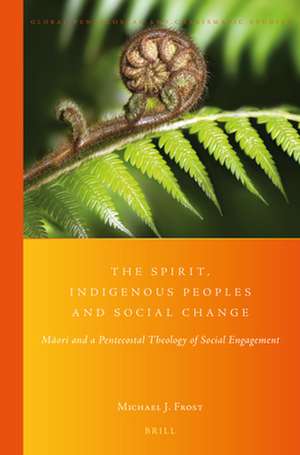The Spirit, Indigenous Peoples and Social Change: Māori and a Pentecostal Theology of Social Engagement: Global Pentecostal and Charismatic Studies, cartea 30
Autor Michael J. Frosten Limba Engleză Paperback – 7 noi 2018
Din seria Global Pentecostal and Charismatic Studies
- 15%
 Preț: 614.43 lei
Preț: 614.43 lei - 15%
 Preț: 489.41 lei
Preț: 489.41 lei -
 Preț: 412.25 lei
Preț: 412.25 lei -
 Preț: 426.73 lei
Preț: 426.73 lei - 15%
 Preț: 371.77 lei
Preț: 371.77 lei - 18%
 Preț: 692.49 lei
Preț: 692.49 lei - 18%
 Preț: 640.05 lei
Preț: 640.05 lei - 18%
 Preț: 715.65 lei
Preț: 715.65 lei - 18%
 Preț: 1060.12 lei
Preț: 1060.12 lei - 18%
 Preț: 692.59 lei
Preț: 692.59 lei - 15%
 Preț: 399.69 lei
Preț: 399.69 lei -
 Preț: 398.60 lei
Preț: 398.60 lei - 18%
 Preț: 1057.29 lei
Preț: 1057.29 lei -
 Preț: 381.10 lei
Preț: 381.10 lei - 15%
 Preț: 413.52 lei
Preț: 413.52 lei - 15%
 Preț: 399.78 lei
Preț: 399.78 lei -
 Preț: 331.05 lei
Preț: 331.05 lei -
 Preț: 407.11 lei
Preț: 407.11 lei -
 Preț: 375.52 lei
Preț: 375.52 lei -
 Preț: 331.89 lei
Preț: 331.89 lei -
 Preț: 330.96 lei
Preț: 330.96 lei - 18%
 Preț: 681.45 lei
Preț: 681.45 lei - 15%
 Preț: 379.20 lei
Preț: 379.20 lei -
 Preț: 406.63 lei
Preț: 406.63 lei - 15%
 Preț: 399.28 lei
Preț: 399.28 lei - 15%
 Preț: 376.78 lei
Preț: 376.78 lei -
 Preț: 373.25 lei
Preț: 373.25 lei -
 Preț: 374.85 lei
Preț: 374.85 lei -
 Preț: 406.10 lei
Preț: 406.10 lei -
 Preț: 391.35 lei
Preț: 391.35 lei - 18%
 Preț: 682.61 lei
Preț: 682.61 lei -
 Preț: 325.03 lei
Preț: 325.03 lei -
 Preț: 363.66 lei
Preț: 363.66 lei -
 Preț: 345.20 lei
Preț: 345.20 lei -
 Preț: 345.87 lei
Preț: 345.87 lei -
 Preț: 338.17 lei
Preț: 338.17 lei -
 Preț: 370.18 lei
Preț: 370.18 lei - 18%
 Preț: 732.44 lei
Preț: 732.44 lei - 18%
 Preț: 690.17 lei
Preț: 690.17 lei - 18%
 Preț: 863.70 lei
Preț: 863.70 lei - 18%
 Preț: 662.82 lei
Preț: 662.82 lei - 18%
 Preț: 635.78 lei
Preț: 635.78 lei
Preț: 376.48 lei
Nou
Puncte Express: 565
Preț estimativ în valută:
72.06€ • 78.30$ • 60.57£
72.06€ • 78.30$ • 60.57£
Carte indisponibilă temporar
Doresc să fiu notificat când acest titlu va fi disponibil:
Se trimite...
Preluare comenzi: 021 569.72.76
Specificații
ISBN-13: 9789004364646
ISBN-10: 9004364641
Dimensiuni: 155 x 235 mm
Greutate: 0.45 kg
Editura: Brill
Colecția Brill
Seria Global Pentecostal and Charismatic Studies
ISBN-10: 9004364641
Dimensiuni: 155 x 235 mm
Greutate: 0.45 kg
Editura: Brill
Colecția Brill
Seria Global Pentecostal and Charismatic Studies
Cuprins
Glossary of Māori TermsIntroduction:Pentecostalism and Indigenous Peoples in the WestPART 1Global Pentecostalism and Social Engagement1 Pentecostalism and Social Concern1.1 What is Pentecostalism? 1.2 Pentecostal Distinctives 1.2.2 Experiential Spirituality 1.2.3 Premillennial Eschatology 1.2.4 Mission, Contextualization and Indigenization 1.2.5 Summary 1.3 Pentecostals and Social Engagement 1.3.1 Pentecostalism and the Disinherited 1.3.2 Progressive Pentecostalism 1.3.3 Pentecostals, the Protestant Ethic and Capitalism 1.3.4 The Pentecostal Prosperity Gospel 1.3.5 Summary2 A Pentecostal Approach to Theology2.1 Why Pentecostal Theology? 2.2 Pentecostal Theology and the Full Gospel 2.3 Pentecostal Theology as Pneumatological and Experiential 2.3.1 Pentecostal Theology as Pneumatologically Centered2.3.1.1 Frank Macchia and Spirit Baptism 2.3.1.2 Amos Yong and Foundational Pneumatology 2.3.2 Pentecostal Theology and Pentecostal Experience2.3.3 Pentecostal Experience and Scripture2.3.3.1 Pentecostals and Luke- Acts 2.4 Pentecostal Theology as Eschatological 2.5 Pentecostal Theology, Contextualization and Indigenization 2.6 Summary3 Towards a Pentecostal Theology of Social Engagement3.1 Pentecostal Empowerment and Social Change 3.1.1 The Spirit, Pentecostal Experience and Personal Transformation3.1.2 The Materiality of the Pentecostal Life: Healing, Prosperity and Blessing3.1.3 The Pentecostal Church as Empowered Community3.2 Pentecostalism and the Ministry of Social Welfare 3.2.1 The Spirit, Pentecostal Experience and Empowerment for Mission3.2.2 The Spirit and the Kingdom3.3 Pentecostalism and Social Action 3.4 SummaryPART 2A Pentecostal Theology of Social Engagement with a Particular Focus on Māori4 New Zealand Pentecostalism, Social Engagement and Māori 4.1 The Socio- political Context of Māori in Aotearoa New Zealand 4.1.1 Early Colonization and Te Tiriti o Waitangi4.1.2 Betrayal of Te Tiriti4.1.3 The Rise of the Prophets4.1.3.1 Kingitanga 4.1.3.2 Pai Mārire (Hauhau) 4.1.3.3 Ringatū 4.1.4 The Current Socio- Political Context4.2 New Zealand Pentecostalism and Māori 4.3 Summary5 Māori Pentecostals and Issues of Social Concern5.1 Interviews and Thematic Analysis 5.1.1 A Contextualist Approach to Thematic Analysis5.2 Themes 5.2.1 Issues of Social Concern for Māori5.2.1.1 Māori, Identity, Marginalization and Cultural Dislocation 5.2.1.2 Māori, Identity, Land and Language 5.2.1.3 Māori, Identity and Pentecostalism 5.2.2 Cultural Identity and Pentecostal Experience5.2.3 Fusion of the Social and Spiritual5.2.3.1 Social Concerns as Spiritual Concerns 5.2.3.2 Pentecostal Experience and Material Reality 5.2.4 Church as Prophetic Community5.2.4.1 Critique of Structures and Systems 5.2.4.2 The Church as an Alternative Community 5.2.4.3 Pentecostalism, Māori and the Spirit of Prophecy 5.3 Summary6 Towards a Pentecostal Theology of Social Engagement in Relation to the Socio- Political Context of Māori in New Zealand 6.1 The Spirit, Ethnicity and Cultural Identity 6.1.1 Pentecostal Experience, Identity and Māori 6.1.2 Pentecostal Experience and the Affirmation of Ethnic Identity 6.1.3 Pentecostal Experience and Conscientization 6.2 Issues of Social and Spiritual Concern 6.2.1 A Move Away from Dualism 6.2.2 The Kingdom of God and Holism 6.2.3 From Prosperity to Materiality 6.3 The Prophetic Potential of New Zealand Pentecostalism 6.3.1 An Eschatological Assist 6.3.2 Pentecostalism, Prophecy and the Powers 6.3.3 A Pentecostal and Prophetic Community 6.4 Summary7 Implications for a Global Pentecostal Theology of Social Engagement7.1 Dualism or Holism in a Global Pentecostal Theology of Social Engagement 7.2 Prophetic Pentecostalism, the Demonic and Confronting the Powers 7.3 Global Pentecostalism and Liberation 7.4 Concluding ThoughtsBibliographySubject and Author Index
Notă biografică
Michael J. Frost, Ph.D (2016), University of Otago, lectures theology at Alphacrucis College in New Zealand. He originally studied science, exploring the relationship between emotional trauma and personal wellbeing, but his recent theological research focuses on pentecostalism and social transformation.
